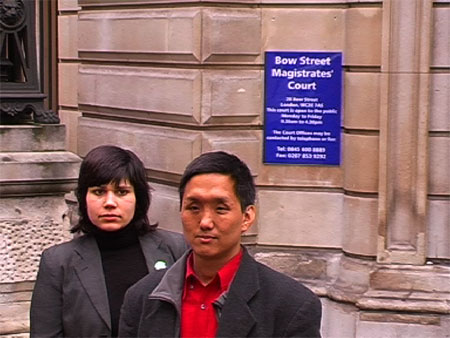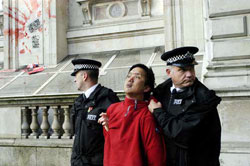Milan Rai – Random Remarks for Radicals No. 15: Comfort Zones
Profiles - Posted on Friday, February 3, 2006 1:03 - 1 Comment
Wednesday 23 November 2005

Milan Rai, author and activist, was sentenced to time in prison at the end of 2005 after he refused pay a fine which he incurred for reading out the names of the Iraqi civilians killed by the invasion at the Cenotaph, the London War Memorial. Milan made the most of his time at HMP Lewes by writing extensive prison diaries detailing his insights into political activism and his experiences of prison life. Below is Milan’s response to a letter received whilst in prison from Dan Robertson, a student and President of the Nottingham Student Peace Movement at the time.
Yesterday (22 November) I received a letter from Nottingham Student Peace Movement, musing on the scope and limits of university activism. (Incidentally, the letter is dated 21 November, so you have some idea of how fast things are turning around at this just-in-time (or is that stuck-in-time) prison.) Dan Robertson expresses frustration at the unwillingness of many students to ‘leave their comfort zone to take more radical positions’.
Now I think by now you know what is going to happen. I’m going to take some of Chomsky’s comments on the topic, reproduce them in somewhat less elegant language, and embroider them. As an academic, Chomsky has had a lot of time to think about the topic, but he’s rarely written about it. One point he has made about the academic scene is that there is a dramatic change of attitude between students and even young faculty, who are only a year or so away from being students themselves. He also points out the recurring pattern of students going off for summer jobs at commercial law firms, for example, thinking they are only going to earn some money, to help them with their debts, and then coming back with an entirely different outlook, often wearing different clothes. Every radical student knows about the hidden agenda of the classroom; and the tacit lessons taught unobtrusively in the course of the school day, lessons in obedience and conformity. The same is true, even more powerfully, of the re-shaping that goes on under the surface at work – even at university.
Another foundational remark from Chomsky concerns the objectives of university reform. Now barely detectable as a live issue, university reform (in a liberatory sense) was a major concern thirty years ago. Chomsky pointed out that what mattered was not alterations to boards of trustees or such like, but the content of the curriculum and the relationship between staff and students. In passing, one might note the same about industrial relations, and the workplace. As we have seen in Germany recently, putting a few token trade unionists on a board is more likely to lead to corruption of the labour movement leadership than real changes towards industrial democracy on the shop floor. Universities are locations of enormous privilege and provide students and faculty with intellectual skills, wide resources and considerable leisure, which can and should be used to contribute intellectually as well as bodily to movements for social change. Chomsky says that intellectuals should make their ideas dominant by their excellence. Quite a challenge, but it’s hard to see what the alternative there is.
Okay, back to “comfort zones”, and student activism. Why should someone become active, and take some part in a movement – “join” the movement? Why should they take a more sceptical attitude towards the mainstream media and official propaganda – let alone the accepted framework of the social sciences, for example? The only reasons that might move someone would be (a) a compelling and irrefutable picture of something that they find outrageous and (b) compelling and irrefutable arguments that undermine official lies and received wisdom. What often provides the key for change is something that makes the picture or the argument human. Chomsky is very self-deprecating about his own tactical judgements. One example he has given is the sanctuary offered by MIT students to a US soldier who had gone Absent Without Official Leave (AWOL) in protest against the Vietnam War. Chomsky argued against it – I think because he thought it would receive too little support, and would fall flat. In the event, the sanctuary was a massive success, with students flocking up to the hall where Mike (I forget his surname) was staying. Teachers moved their classes there, students slept there; the sanctuary apparently changed opinion on campus. Instead of arguing in the abstract, students were confronted with a young person much like themselves, facing an appalling decision, and they changed their minds as the arguments were put in this new human framework, with a new sense of immediacy (Face-toface, hands-on, immediate involvement. Familiar?). The sanctuary ended when Mike was arrested and taken off to face military courts. The effect on MIT seems to have been substantial and lasting.
So why would someone move out of their comfort zone – whether on campus or anywhere else? There are lots of reasons not to. In marketing, in the commercial world, there is an emphasis on understanding and resonating with the attitudes of those you are trying to influence, repeating your message regularly and in a variety of ways. Advertising is based on manipulation, campaigning is about honesty and persuasion, but there are useful lessons that we can learn, nevertheless. Dan writes, quite rightly, ‘even the realisation that those calling for radical change are not easily pigeonholed and derided [as] “hippies” or “nihilists”, but are compassionate and intelligent human is actually an important step in some cases.’ This applies outside university as well. Finally, there is another attitude shift which is of equal importance, which is for intellectuals, whether “radical”, “liberal” or “conservative”, to rid themselves of the delusion that their form of literacy and education means that they are both more intelligent and (therefore) more suited to dominate and rule the less-highly-schooled. Intellectuals must free themselves of the contempt for “the masses” which has undermined movements for social change in the past. If they can form a true partnership with other working people, intellectuals can help rather than hinder social progress.
1 Comment
nathy452



merci pour ce topic, si sueulement vous etiez un peeu plus claire 🙂